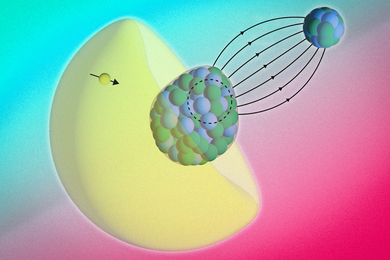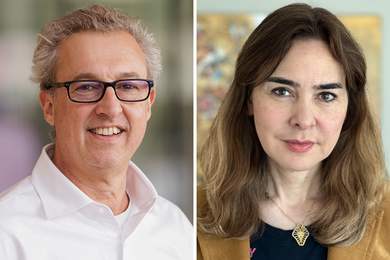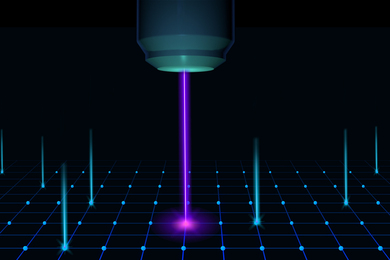The School of Science welcomes five new professors in the departments of Earth, Atmospheric and Planetary Sciences; Mathematics; and Physics. Their research ranges from exploring problems in pure math to the evolution of animal life on Earth to the evolution of galaxies.
Kristin Bergmann, assistant professor in the Department of Earth, Atmospheric and Planetary Sciences, works to reconstruct the record of environmental change from observations of sedimentary rocks from latest Precambrian to Ordovician time. To date, she has worked on carbonate sedimentary rocks in order to better understand how the chemistry and climate of the oceans and atmosphere have affected the evolution of animal life over this time. She received a BA in geology and environmental studies from Carleton College in 2004 and completed her PhD at Caltech in 2013 under the direction of professors John Grotzinger, Woody Fischer, and John Eiler. Before joining the MIT faculty, she was a junior fellow with the Harvard Society of Fellows, working with Professor Andy Knoll.
Davesh Maulik, professor of mathematics, completed his doctoral work at Princeton University in 2007, studying under Rahul Pandharipande. That year, he received a five-year research fellowship from the Clay Mathematics Institute, which he took in postdoctoral appointments at Columbia University and at MIT. In 2011, he joined the faculty at Columbia as an associate professor with tenure. In 2009, he received the Compositio Mathematica Prize with co-authors for an outstanding research publication. He was an invited speaker at the International Congress of Mathematicians in Korea in 2014.
Maulik works in algebraic geometry. His interests concern moduli spaces of geometric objects — for example, algebraic curves or sheaves — and various questions regarding their structure. In many cases, these require developing and exploiting connections with related fields such as mathematical physics, symplectic geometry, and representation theory.
Michael McDonald joins the Department of Physics and the Kavli Institute for Astrophysics and Space Research as an assistant professor. His research focuses on the most massive gravitationally-bound objects in the universe: clusters of galaxies. In particular, he is attempting to understand the life cycle of gas, stars, and galaxies in these rich environments, and how highly energetic processes such as supernovae and jets from supermassive black holes can influence the evolution of these systems. This research makes extensive use of both ground- and space-based telescopes at nearly all wavelengths, including (but not limited to) the Magellan and ALMA observatories in Chile, the South Pole Telescope in Antarctica, and the space-based Chandra and Hubble telescopes. Aside from research, McDonald has been involved in the development of the Maryland-Magellan Tunable Filter on the Baade telescope at Magellan and is a member of the Science Working Group for the European Athena X-ray telescope, scheduled to launch in the late 2020s.
McDonald received a bachelor’s degree in physics in 2005 and an MS in 2007, both from Queen’s University in Canada. He completed his doctoral work at the University of Maryland in 2011, working with Professor Sylvain Veilleux on an emission-line study of giant elliptical galaxies. In 2012, McDonald was named a Hubble postdoctoral fellow at the Kavli Institute for Astrophysics and Space Research at MIT.
Andrei Neguţ, assistant professor in the Department of Mathematics, concentrates on problems in geometric representation theory, an area that overlaps studies in algebraic geometry and representation theory. His results connect to areas in mathematical physics, symplectic geometry, combinatorics and probability theory. His current research focuses on moduli of sheaves, quiver varieties, quantum algebras, and knot invariants. Neguţ received a PhD from Columbia University in 2015, studying under Andrei Okounkov. He completed a master’s in mathematics from Harvard University in 2012 and a BA from Princeton in 2009.
Aaron Pixton, assistant professor in the Department of Mathematics, works on various topics in enumerative algebraic geometry, including the tautological ring of the moduli space of algebraic curves, moduli spaces of sheaves on 3-folds, and Gromov-Witten theory. Pixton was a three-time Putnam Fellow as an undergraduate at Princeton University, where he received his BA in mathematics in 2008. In 2009, Pixton completed Part III of the Mathematics Tripos at Cambridge University. He then returned to Princeton and completed his PhD in mathematics in 2013, studying under Rahul Pandharipande. That year, he received a five-year research fellowship from the Clay Mathematics Institute, and was appointed to a visiting postdoctoral fellowship at Harvard University.






